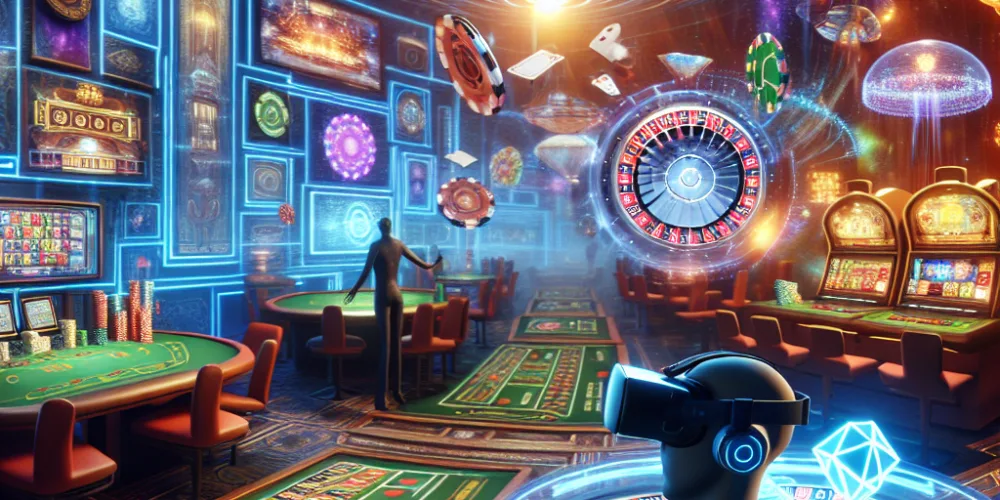In the evolving world of digital entertainment, casino gaming has consistently pushed the boundaries of technology and consumer experience. As technology advances, so too does the immersive nature of gaming. The latest frontier in this dynamic industry is the burgeoning sector of Virtual Reality (VR) casinos. These platforms are transforming the traditional online gambling landscape, offering a uniquely immersive environment that mirrors the experience of being on the floor of a real-world casino.
VR technology, which involves head-mounted displays (HMD) and sometimes other body-tracking devices, place users inside a digital world where they can interact with their environment and other players. This provides a degree of interaction that traditional online casinos cannot match, where the gameplay was limited to clicking buttons on a screen. VR casinos create a comprehensive sensory experience, complete with detailed casino sights, sounds, and even the ability to engage in conversations with fellow players.
Several industry leaders are pioneering this virtual leap. Notable among them is SlotsMillion, the first VR casino to offer real money gaming. In SlotsMillion’s VR environment, players walk through an elaborately designed casino floor, complete with over 40 of the most popular slot games and the ability to interact with other players. Another major player is Casino VR Poker, which offers a deeply engaging Texas Hold’em poker experience, featuring full-body avatars that mimic player movements and gestures via VR controllers.
The rise of VR casinos is buoyed by improvements in VR technology and more affordable hardware. Devices such as Oculus Rift, HTC Vive, and PlayStation VR have become more accessible to the average consumer, indicating that the market for VR gambling is poised for growth. The VR gambling market is projected to reach $2.85 billion by 2025, according to a report by Research and Markets.
From an operator perspective, the appeal of VR casinos is multifaceted. First, it caters to the younger demographic of gamblers who seek cutting-edge, interactive experiences. This demographic, raised on a diet of video games and high-speed internet, finds traditional online casinos lacking in engagement. VR casinos also offer operators enormous data collection opportunities with new metrics like player movement and gaze tracking, which can be used to enhance user engagement strategies and personalized marketing.
Moreover, VR casinos help bridge the gap between social and real money gaming. The social interaction in VR games is more akin to that of a real casino, which could help convert players from social casino games to online gambling. The social aspect of VR cannot be understated; players return as much for the gameplay as for the interaction with other enthusiasts. This community-building component is vital for the growth of the platform.
However, the transition to VR also presents challenges. High setup costs for effective VR environments and the need for powerful hardware can be barriers to entry for some users. There is also the ongoing debate about gambling addiction and whether the immersive nature of VR might exacerbate such problems. Regulators are still catching up with the technology, and guidelines need to be established to ensure the mental and physical safety of users.
The future of VR casinos will likely integrate more advanced features as technology progresses. Imagine a scenario where gesture recognition technology becomes so advanced that you could order a virtual drink from a virtual bartender, or where facial recognition could read your expressions to offer personalized gaming advice. Artificial Intelligence could be used to enhance user interfaces and hyper-personalize the gaming experience, making every virtual visit uniquely tailored to the player’s preferences.
In conclusion, VR casinos represent a significant innovation in the online gambling industry, offering unparalleled realism and engagement. As VR technology continues to evolve and become more mainstream, it promises not only to reshape the landscape of online gambling but also to challenge our very notions of what constitutes a casino experience. This blending of digital and physical realities might just be the most exciting gamble the casino industry has taken yet.

David Farbacu is a seasoned writer with a passion for games, gaming, casinos, and Xbox. With a wealth of experience in the industry, David brings insightful reviews, comprehensive guides, and engaging articles that cater to both casual gamers and hardcore enthusiasts. His expertise spans across various gaming platforms and genres, making him a go-to source for the latest trends and developments in the gaming world.

